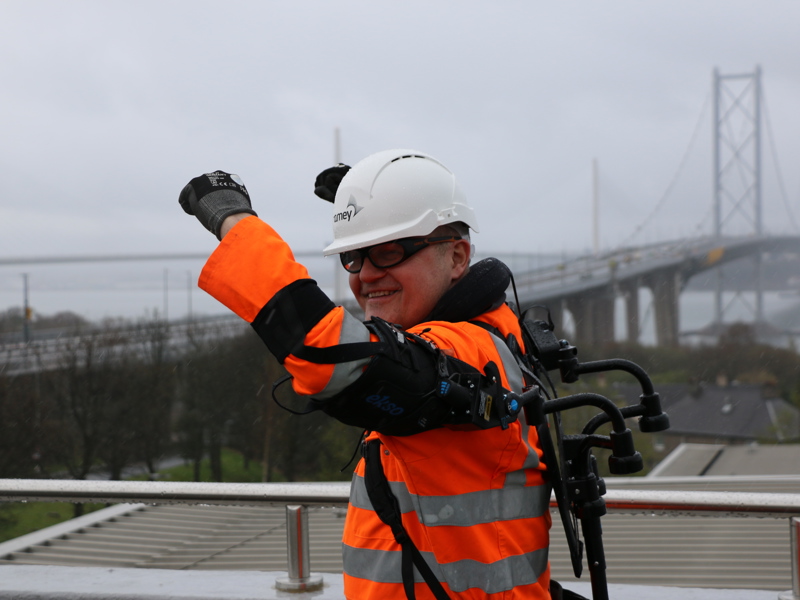In its quest for zero harm, Amey is trialling an innovative robotic exosuit with operatives working on the Forth Bridges in Scotland, which aims to reduce the risks posed by manual handling tasks.
In partnership with Amey, Transport Scotland has purchased the suit to be trialled in its Forth Bridges Unit. The first of its kind in Scotland, the EksoVest is a new piece of safety work wear that sets out to reduce the likelihood of on-the-job injuries.
The EksoVest is an external metal frame that mirrors elements of the human skeletal structure. It is powered by a series of springs and supports workers’ arms to assist them with tasks ranging from chest height to overhead, providing between 2.2kg to 6.8kg of lift assistance per arm, making lifting objects easier.
The tasks that the operatives undertake on the Forth Bridges predominately require the use of the upper body. The EksoVest is lightweight and has been deigned to alleviate strain on operatives’ arms who are working on tasks above chest height. Weighing 4.3 kilogrammes, the EksoVest is comfortable for operatives to wear in all conditions whilst still enabling them the freedom to move.
Mark Arndt, Operating Company Representative for the Forth Bridges Unit, said: “Integrating technology into everyday tasks to reduce the risk of on-the-job injuries to my operatives, is the driving force behind trialling the EskoVest. The motorised skeletal vest not only has the capability to physically enhance the safety of our people, but it aims to lessen fatigue which will lead to an increase in productivity and a reduction in sickness absence.
“Our operatives have been wearing the vest to carry out a range of tasks including overhead grinding and welding to repair joints in the Forth Road Bridge, installing underdeck access, installing streetlighting and laying out and removing traffic management. These tasks require our operatives to manually handle weighted objects, so by providing them with a robotic vest that supports their skeletal structure and arms, I’m hoping that we can reduce the weight that they are managing and therefore the potential for injuries.
“We are still at the early stages of this exciting trial which began at the start of April 2019 but we’re hopeful that this wearable technology will enhance the wellbeing of our staff by making their jobs easier. This complements the range of other technological improvements being rolled out at the Forth Road Bridge as part of Transport Scotland’s drive for new innovations, including high definition VR models, wearable inspection tech, real-time big data harvesting and machine learning.”
Through advancements in robotic innovation, the EksoVest aligns to the principles set out by Amey’s Vision 2030 to remove people from harm. By embracing and utilising this technology on the Forth Bridges, improvements can be made to the safety and wellbeing of operatives undertaking physically challenging and manual tasks.
One of the employees who has trialled the EksoVest is Blair Masterton, a rigger at the Forth Road Bridge. He said: “This is definitely a good piece of kit in the right work situation. It’s easy to put on and there is a slight assist when lifting staging boards and other heavy items., It feels a bit tight and can get in the way when wearing a harness, but this trial should hopefully help to identify areas where improvements can be made.”
Kenny Horn, a welder/fabricator at the Forth Road Bridge, also commented: “I found the EksoVest to be helpful when grinding above head height, although I eventually did get pins and needles in my arms after using it for a prolonged period!”
The feedback gained from this trial will help to refine new technologies in a way that sees Amey’s front line operational staff aiding in the development process.
The EskoVest trial is being watched with anticipation by other businesses within Amey to see the potential for utilising it for other tasks, such as waste collection and the installation of scaffolding.
